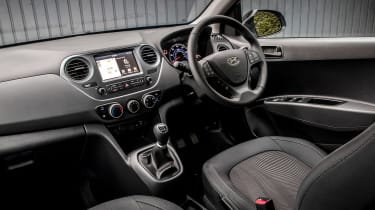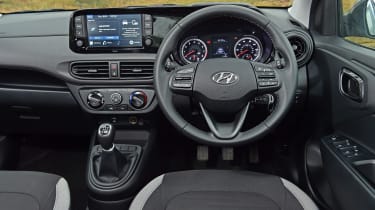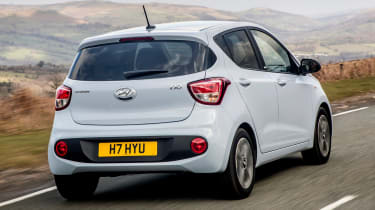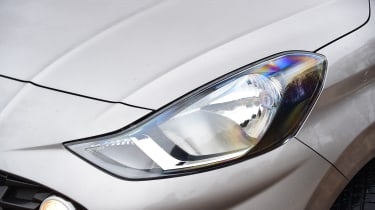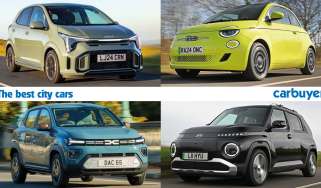Hyundai i10: old vs new
How does the new Hyundai i10 compare to the car it replaces? We see whether you should buy the old model or the new one
Gone are the days when city cars were excused for lacking equipment, power and sturdiness; today, they have to be safe, well-connected, cheap-to-run and reasonably spacious, all at a low price.
The Hyundai i10 isn’t the cheapest city car out there (it starts from just under £13,000, and can be specced to over £18,000) but it’s easier to recommend than the MG 3, Toyota Aygo and the spacious-yet-spartan Dacia Sandero. It’s one of our favourite city cars, offering more technology than the Volkswagen up! and a generous five-year warranty. There are fewer direct rivals this time around, now that the Skoda Citigo, Smart ForFour and SEAT Mii are electric only, and the Renault Twingo and Suzuki Celerio are no longer available.
In some respects the new i10 offers a big improvement over the old one but there’s also a lot that’s carried over. We’ve compared them to see which you should buy.
Styling
Before the previous Hyundai i10 came out, the car had very forgettable styling. But the last i10, sold from 2014 to 2019, changed the recipe with a sharp front end, defined wheel arches and an eye-catching window line. It also comes with daytime running lights in the grille, while most cars get body-coloured door handles and top models get alloys and fog lights.
The new model looks pretty similar to its predecessor but just a little sharper. The changes keep the i10 looking fresh, and you may appreciate the wider choice of paint colours and the new option of a contrasting roof. Only the cheapest model misses out on alloy wheels now, and all i10s get tinted windows and painted door handles. New for this generation is a punchy looking N Line version, with sporty styling inside and out and exclusive touches.
Interior and technology
You probably wouldn’t want to tackle long journeys regularly in many cars this size, but the i10 feels well-built, comfortable and well-insulated from all but the worst noise and jolts. There are some cheap materials in prominent places but it’s acceptable given the car’s enticing price. Base ‘S’ cars get a USB connection and electric front windows, while SE is much better equipped with Bluetooth connectivity, DAB radio, cruise control and heated power-adjustable mirrors. A touchscreen with sat nav is fitted on post-2016 Premium SE versions.
The technology on board the new i10 is impressive, and not just for a cheap car. Whereas the more expensive Volkswagen up! only features a smartphone cradle, nearly all i10s get a large touchscreen like the one in the Hyundai Kona SUV. A standard leather steering wheel feels great to the touch, and this time around there’s no ‘S’ spec that’s missing desirable features. All cars with the touchscreen also feature a reversing camera, navigation and smartphone mirroring. Elsewhere, Hyundai has managed to keep the i10’s grown-up feel.
Engines
Regardless of whether you choose the old or new Hyundai i10, you have the same choice of 66bhp 1.0-litre and 86bhp 1.2-litre naturally aspirated petrol engines. The least powerful offers cheaper insurance and 56mpg, but it’s only really adequate if you’re going to be spending nearly all your time around town. The 86bhp version is two seconds quicker from 0-62mph and is more willing at higher speeds. It’s an affordable £500 option on the new i10, and it’s the engine we’d recommend - especially as it still manages 52mpg. An automatic gearbox is available but it’s best avoided unless you must have it; there’s a reduction in fuel economy and, when mated to the 1.0-litre, makes the i10 one of the slowest cars on sale.
The latest i10 comes in a sporty N Line trim for the first time and this is powered by a new 99bhp 1.0-litre turbo engine. It’s quick for a car of this size, and makes the N Line feel nearly as racy as the Volkswagen up! GTI. Although it’s more expensive to buy, there’s no penalty in terms of fuel consumption.
Safety
The previous i10 scored four stars in the Euro NCAP test, which is reasonable but not outstanding. When they were originally tested in 2011, the Skoda Citigo and VW up! scored five stars but they were taken down to a three-star score when retested in 2020, in part due to the lack of autonomous emergency braking. Every i10 now gets this technology as standard, plus lane-keeping assist and driver attention alerts, so the new car should score well when it’s crash-tested. These features were contained in an optional package on later versions of the last-gen i10s.
Verdict
The new i10 has technology on its side but if you’re not bothered by a large infotainment screen, the old i10 will appeal as it will be cheaper. Nearly new i10s will still come with the balance of Hyundai’s five-year warranty. However, on a PCP finance deal - how most people buy new cars - the latest i10 may have low interest rates so the difference in monthly payments between old and new might not be very much at all. The brand-new i10 carries the latest tech and is better set to last into the future, so we’d pick this model if there’s not much difference in the price.
Read our guides to the best cars for students and the best used small cars.
Recommended
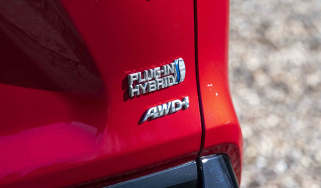
Petrol and diesel car ban relaxed with hybrids permitted beyond 2030

Classic car tax exemption: which historic vehicles qualify?
Most Popular
Tips & advice

Car dashboard warning lights: what does each symbol mean?

Electric car charging stations: public networks, charger types, apps and maps



